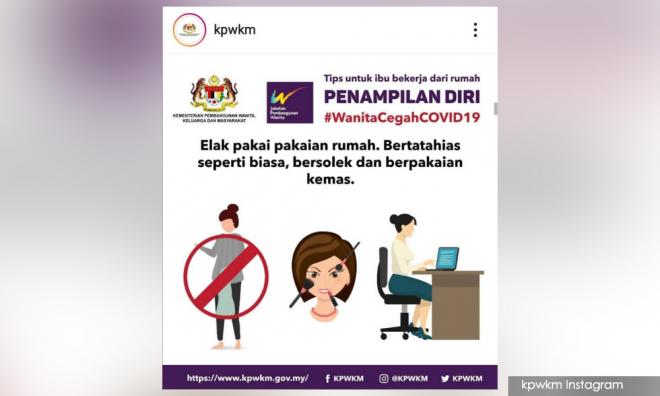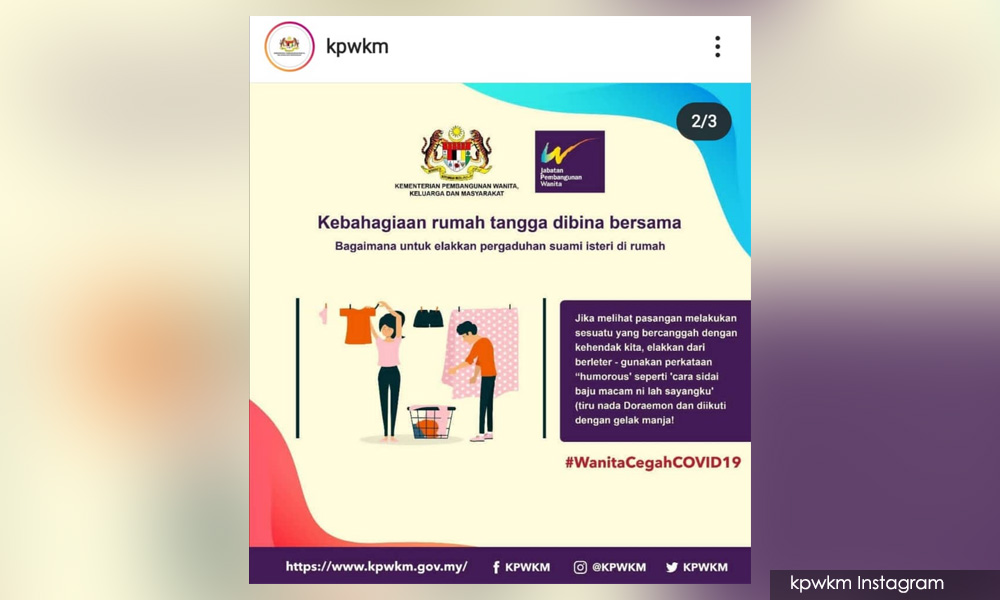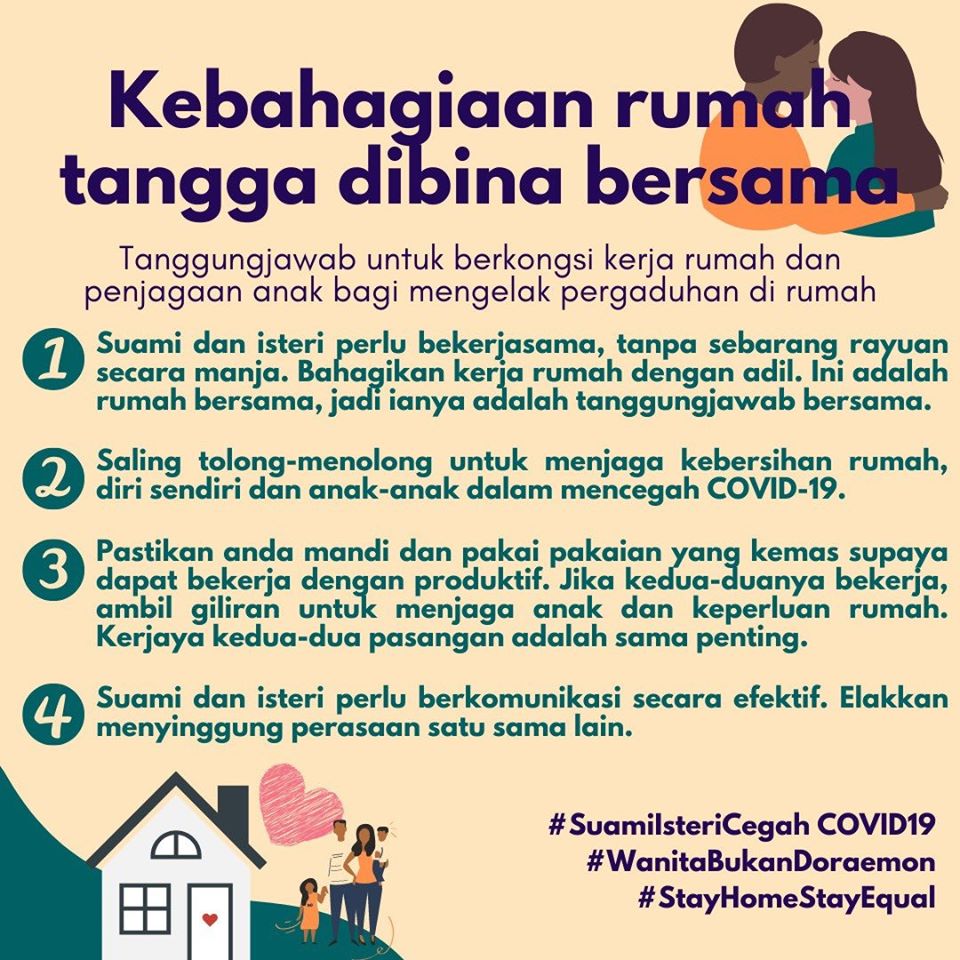
Last week, Doraemon gained unexpected international attention thanks to the Women, Family and Community Development Ministry. The ministry’s unfortunate #WanitaCegahCOVID19 campaign featured ill-conceived advice, that included the cartoon character, for how women should manage themselves, their husbands and the home during a semi-lockdown. Predictably, it gave rise almost instantly to countless memes.
The campaign also made international news. Publications from the South China Morning Post to The Canberra Times to The Guardian reported on the ministry’s campaign. Even Trevor Noah used it as material for his The Daily Show. The South African political commentator and comedian jabbed: “While some Asian countries are dealing with the second wave of the coronavirus, other countries are dealing with the wave of their own stupidity.” Ouch.
The ministry has since apologised for the posters and withdrawn two of its tips. However, it would seem that it remains clueless as to what the real issues are behind the public outrage and international derision.
What makes me say this? It’s all in the ministry’s apology. The apology states that going forward, the ministry would be more careful before sharing “inappropriate” advice that “touched on the sensitivities of some parties”.
By suggesting that its advice was inappropriate because of some parties’ sensitivities is to miss the point altogether. The point isn’t that some people are sensitive and their sensitivities need to be considered.

The point is, the ministry’s advice was blatantly sexist. Firstly, because it promoted a higher standard for women by advising them to wear make-up while they worked from home. And secondly, by infantilising women by asking them to mimic Doraemon.
The fact that the ministry actually thinks women need to put on make-up in order to work better lets us know that it promotes double standards for women and men. In our gender-unequal society, women are told that if we don’t look a certain way, for example with make-up on, we won’t be good enough and we won’t be taken seriously as professionals.
The fact is, men don’t need to live up to those same standards. Hence, what the ministry is saying is that women need to achieve a higher arbitrary standard about appearances than men if they are to succeed. This is disquieting advice from the ministry that is responsible for advocating women’s rights, equality and wellbeing.
Just to be clear, I have no objections to women (or men) wearing make-up. I occasionally wear some myself when I feel like it. But I certainly have objections to women being told that they can only succeed professionally if they put on make-up, or dress in a particular way, or speak in a certain fashion when men don’t have the same standards applied to them.
Which brings me to my next objection about the ministry’s now-withdrawn advice. That is, that a woman should use a Doraemon-like voice and giggle when telling her husband to share in the household chores.

Personally, I would be freaked out if either my wife or husband suddenly took on the tenor of a popular cartoon robot cat from Japan, and then giggled, when asking me to be responsible for our shared living space. More importantly, this particular advice signals that the women’s ministry expects women to infantilise themselves as if that would result in their spouses taking them seriously.
Women the world over are constantly infantilised, or told to be cutesy or sweet, so as to accede to and not disrupt male power and privilege. We are told it would be unbecoming of a woman if we didn’t act in these ways. We are told that if we didn’t speak softly – or in this case, if we didn’t speak like Doraemon and then giggle – we would be responsible for creating strife at home and at work.
What is galling for me is that the ministry in charge of women’s affairs is complicit in a system that keeps women down. These social rules about women’s behaviour are all ways in which a sexist society makes it even more difficult for women to achieve parity with men at work and at home.
What makes it all much worse is that the campaign wasn’t a one-person idea. As one Malaysiakini reader pointed out, what’s really scary is that the campaign was “designed and written by a team, vetted by a committee, revised and checked again, and approved by higher-ups”. So the campaign reflects a systemic problem. And that problem unfortunately isn’t going to go away anytime soon especially if the ministry continues to demonstrate a lack of understanding about what the issues are really all about.
In their ad campaign for Covid-19, the ministry certainly failed women and heterosexual families in creating greater awareness about shared responsibilities around housework. Thankfully, when the government fails us, citizens often rise to the occasion.
Projek Wawasan Rakyat, for example, shared this poster on its social media feed:

The youth organisation is clearly miles ahead of the ministry in advocating for gender parity at home. Its advice also promotes joint responsibility for managing the home harmoniously during the movement control order.
Here’s my own contribution to educate the women’s ministry. There’s so much you can learn from just researching and reading widely. Regrettably, this was something those who were responsible for the ad campaign clearly didn’t do.
If they had done that, they would have found all kinds of strategies for how women and men can work together to ensure a fairer distribution of household chores.
For example, the author of Fair Play, Eve Rodsky, provides some tips for sharing the mental load and execution of household chores that do not at all require women to infantilise themselves.
First, Rodsky says, customise your deck of “task cards”. Housework isn’t just unrewarding, time consuming and endless, it is also invisible and mostly unpaid. So is the mental load of keeping track of what needs to be done. Hence, customising your deck of task cards around household chores and then making it visible, has immense value.
The next step, Rodsky says, is to take stock of all those tasks and prioritise them according to what is most important to you and your family. In these unusual times of staying home for extremely long periods of time, doing this is even more important. Equally important is to give yourself permission to do less.
Next, deal the cards. Which card will you hold? Which card will your spouse hold?
And finally, this will only work if each spouse owns that task completely. That means being responsible for conceptualising, planning and then executing the task they are responsible for from start to finish. “Establish a measurement of accountability,” Rodsky stresses. This measure of accountability would be similar to the measure of accountability you would be given for a task at the office.
In fact, I highly recommend that the women’s ministry watch the interview with Rodsky that is freely available on YouTube. It has useful pointers about how to support women in promoting a fairer division of household chores between men and women which is critical to happy marriages.
The fact is, studies show that women still do two-thirds of household chores. And all of the “worry work” around housework nearly always falls disproportionately on women.
Even when a woman earns more than her husband, she still does more of the household chores. In fact, according to some studies, in heterosexual households, the more a woman earns as the main breadwinner, the less her husband will contribute to housework. The reverse is hardly ever true.
These are the kinds of issues the women’s ministry need to be studying, and educating themselves and the public on. If they did, then public funds would go into promoting more equality between women and men.
If the #WanitaCegahCOVID19 campaign is anything to go by, it would seem the ministry has not done this work. And under its new minister and deputy minister, I have no confidence it will.
That is bad news for Malaysia. It means we can expect that public funds will continue to be channelled towards perpetuating, rather than dismantling, the systems that keep gender inequality in place.
JACQUELINE ANN SURIN is a Drama@Work consultant, a specialist meeting facilitator and a leadership coach. She was an award-winning columnist, a journalist for 20 years, and the co-founder of The Nut Graph before switching careers. - Mkini



No comments:
Post a Comment
Note: Only a member of this blog may post a comment.